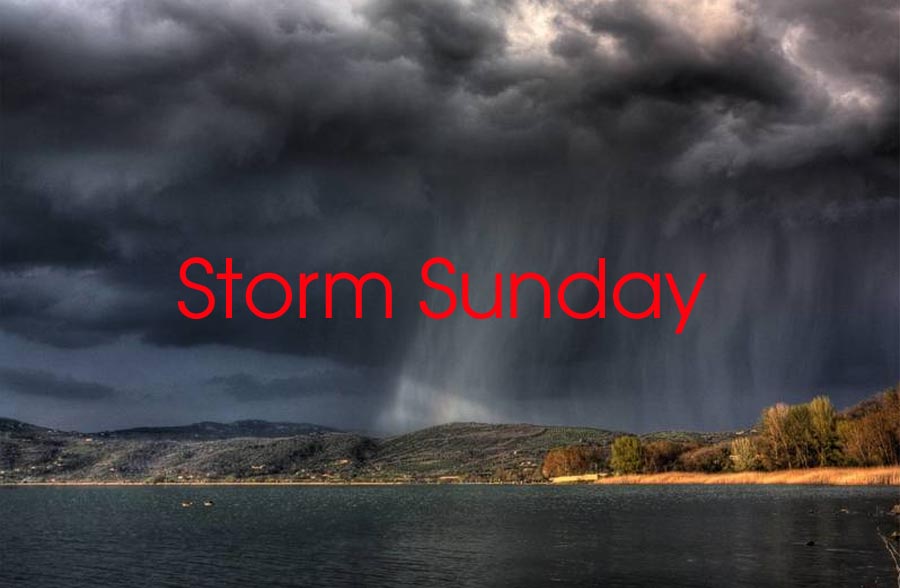Storm Sunday Year C 18-9-2016 Psalm 29 Lk 8 22-25
Storms and our faith: storms and our godly dealing with the Earth community.
We’ve spent a few moments meditating on the way we react to the experience of storms. We’ve been reminded of where our attitudes come from; reminded of feelings that storms can provoke in us. And they can do that even though we may know the science–the way lightning and thunder are produced–where all that rain comes from; why it sometimes transforms itself into devastating hail. And the pictures we’ve all seen of tremendous dust storms remind us how we’ve changed the nature of storms: combine land-clearing, over-grazing, ploughing and drought and a blustery windy day becomes something more like an apocalypse.
We are emotionally engaged with storms too – they bring us to places of fear, depression, exultation or remorse. And those are emotions often associated with our spirituality. So can we ask if we’re spiritually connected with God through the experience of these different kinds of storms, or does our scientific knowledge put that connection to bed for us?
Today, we’ve heard two different accounts of storms and faith. Psalm 29 and the Gospel. Maybe we should look back at the Psalm text for a few moments. The psalmist tells the Heavens and the Earth to hear God’s voice in storms. We are to hear God’s voice in the noise, the power and the destructive force of storms, and to join the rest of creation in feeling fear, awe, wild joy and hope in the greatness of God who promises us strength and the blessing of peace.
Perhaps we have difficulties with appropriating something so ancient and alien to our perspective. Maybe it can help if we realise that many scholars believe this Psalm was itself a re-writing or a refutation of an even more ancient hymn to Baal – the Canaanite storm god.
So the original was likely to have been a prayer or song which – with the help of some money or gift – would appease the anger of this god of storms. The Psalmist has taken on this protection-racket and set out to free people from slavery to such a capricious god. The psalmist reveals the true God who is sovereign; God whose choices don’t depend on people’s willingness to pay; God who’s not confined by our preconceptions of what is strong or immovable – neither the cedars of Lebanon nor even her mountains; God who will bring about the promise, and bless all families of Earth with strength and peace.
Today’s familiar Gospel passage where Jesus wakes up and stills the storm is in a sense a parable where the Psalm’s challenge and its promise are enacted. For each of us, the storm is different. Our storm may come as a sudden, frightening pain in the night; or the day our doctor tells us our life can’t be the way we planned it any more. For lots of us, our storm comes suddenly when the job we thought we had is no more.
For some children and adults, the storm strikes us when someone we thought cared for us – someone we thought would stick by us – suddenly doesn’t any more; they hurt us or they go away. Or maybe someone we imagined was going to live all our life with us suddenly dies.
But why call these things storms? What’s this storm in the Gospel got to do with our lives? How does this relate storms to our faith – is it foreign to us?
Yes and no. We still ask the perennial human questions when any storm brings disaster; How could a God of love let this happen to helpless, innocent people? Does the Psalm or the Gospel address this question in any way for us? Or are we asking the wrong question?
I must confess, looking at news bulletins and social media comment on the heavy rains of last week, I’m finding some other compelling questions which need to be asked together with this perennial God one. How could the council give people building permits for Waterfall Gully Road? Or further back with those dust storms many of us have known; How could we have kept on using such inappropriate farming practices until so recently? Or mud-slides; Don’t people know by now what happens to hillsides in heavy rain if you’ve cut down all the trees? Or unprecedented super-hurricanes; When will the world wake up to the way our emissions are warming the oceans?
We’re into our third week now of exploring an ecological spirituality – how our spiritual life (our relationship with the divine) is both shaped by our relationship with nature, and shapes our treatment of nature. This has profound implications for us in our spiritual responsibility to the Earth community.
We don’t shoulder this alone. We have in our boat the one who can command the wind and the sea; and we know only God can do that. But that same person in our boat is so exhausted that he escapes crowds and then sleeps through a storm that terrifies experienced sailors. And that’s a human being.
Maybe that’s the miracle in this story; God and you and I are all in the same boat. If we’re in trouble, God’s here too. God is in the boat, because that exhausted teacher is asleep in the boat with us; because Jesus chooses to be with us; to be one of us. We tend to think of this as the story of Jesus calming the storm. But maybe we could think of it as the story of the way God shares our storms with us; how God chooses to be in the same boat with us. If we can see this, our life’s storms become very different. Sometimes God calms the storm. Sometimes God lets the storm rage, and calms the child. Amen.

